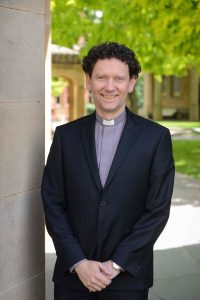
One of the issues facing the first Christians, all of whom were Jewish remember, was that they had had this really powerful experience of Jesus after his death; and they had to figure out how to describe that. Jesus was a charismatic teacher, he had not backed down from his message that God loved everyone, even in the face of death, and then, after his death, the disciples had a really powerful experience of his Spirit: somehow, against the odds, they experienced his life and energy, giving them life and energy in return. The word they used to try and explain the unexplainable was resurrection, but, really, all they could say with any confidence, was that his Spirit was with them.
In the early Church, the language they used to try and explain this was that the Spirit of the risen Jesus was still with them.
There is another metaphor, though, which I find very helpful and I think you might also find helpful as we try to get to grips with what resurrection or what eternal life might possibly mean.
It’s the understanding of the “Energies of God”. It’s an Eastern Orthodox doctrine. One of the key developments in Eastern Orthodox churches: Coptic, Greek, and eventually Russian Orthodox, was that God was understood to be an absolute mystery. How could we tiny human beings possibly understand the Creator of the Universe. As I like to discuss with one of our physics teachers, Mr Jaldiani, it’s like trying to see past the radiation that surrounds the Big Bang and observe the Big Bang itself: you just can’t do it! So too, our efforts to describe God, God the Creator, are inevitably going to be limited.
In the Eastern Orthodox churches this is a very strong tradition. That’s why, if you attend an Orthodox service, there is a great deal of emphasis on the beauty of the liturgy and the mystery of the service.
But, within this experience of God as mystery, the first Christians had a very powerful experience of God. It was real and it changed their lives. In an effort to try and describe this, the Western Church talked about the Holy Spirit: the Spirit of the risen Jesus.
The Eastern Church, on the other hand, talked about the Energies of God. John of Damascus 675–749 was the first to talk about this experience of God as pure energy. The Orthodox were very strong on the notion that this energy came directly from God: it was like feeling the rays of the sun on your skin. In fact, that was the analogy they used: the Energies of God are like the rays of sun: they come directly from the sun and they give us life in turn. Gregory Palamas (1296–1357) in the Middle Ages was particularly fond of this metaphor.
This beautiful metaphor of the Energies of God was virtually lost to the world. As most of the Eastern Church struggled under the Ottoman Empire, it lay dormant, just waiting to be rediscovered. It was the Russians who did it. Under the oppression of the atheist Soviet Regime, the brightest Orthodox minds fled Russia and ended up in Paris, mainly because French was what the intelligentsia in Russia spoke. And here they began to explore in earnest the treasures of their tradition and rediscovered the beautiful doctrine of the Energies of God. Georges Florovsky was the first to say, “We need to rekindle our interest in this beautiful doctrine” and Vladimir Lossky was the one who took up the challenge, in his beautiful book The Mystical Theology of the Eastern Church.
The Energies of the Spirit. I think this is a metaphor for God that makes sense of how we can talk about eternal life. If God is truly uncreated energy, influencing every part of our lives, giving us insights and wisdom that we didn’t know we had, giving us the strength to perform our day-to-day tasks, when we feel we have no strength left to give, then this same energy will give life to our spirits and free us to be at one with the Universe after our deaths. We will truly be set free.
The Reverend Dr Theo McCall
School Chaplain
